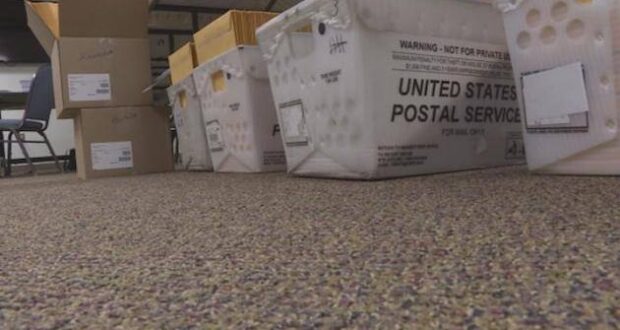A federal court rejected a motion by the Democratic Party of Illinois to intervene as a defendant in our lawsuit challenging an Illinois election law permitting mail-in ballots to be received as long as two weeks after Election Day.
The ruling and opinion comes in the federal lawsuit we filed on behalf of Congressman Mike Bost and two other registered Illinois voters to prevent state election officials from extending election day for 14 days beyond the date established by federal law (Rep.Michael J. Bost, Laura Pollastrini, and Susan Sweeney v. The Illinois State Board of Elections and Bernadette Matthews (No. 1:22-cv-02754)).
In the court’s ruling and opinion on the Democratic Party of Illinois motion to intervene, U.S. District Judge John F. Kness held that its participation would “delay this time-sensitive case:”
[Democratic Party of Illinois] cannot meet its burden to show that its interests will not be adequately represented by the parties to the case. As a result, [Democratic Party of Illinois] is not entitled to intervene as of right. Separately, because allowing [Democratic Party of Illinois] to intervene would threaten to delay this time-sensitive case further, the Court, in its discretion, denies [Democratic Party of Illinois] motion seeking permission to intervene as a party under Rule 24(b). Accordingly, the Court denies DPI’s motion in its entirety.The Democratic Party of Illinois is represented by the Elias Law Group, whose founding partner is Marc Elias, the controversial lawyer for Hillary Clinton’s campaign.
Federal law defines election day as “the first Tuesday after the first Monday in November of every even-numbered year.” The initial complaint states:
Despite Congress’ clear statement regarding a single national Election Day, Illinois has expanded Election Day by extending by 14 days the date for receipt and counting of vote-by-mail ballots
We point out that the current Illinois election law allows vote-by-mail ballots received up to 14 days “after the polls close on Election Day” to be counted as if they were cast and received on or before Election Day. Illinois law also provides that “[e]ven vote-by-mail ballots without postmarks shall be counted if received up to 14 calendar days after Election Day if the ballots are dated on or before Election Day.”
Our lawsuit notes:
The Board … advised that the number of ballots received after Election Day through November 17, 2020, could materially affect the unofficial election results.
***
[Illinois’ own data indicates that] Illinois received 266,417 vote-by-mail ballots statewide during the period from November 3rd through November 17th.
***
[M]ost of the 266,417 vote-by-mail ballots were received after Election Day, which would mean that as many as 4.4% of votes cast in 2020 were received after Election Day. [Emphasis in original]We argue that holding voting open for 14 days past Election Day violates the constitutional rights of voters and candidates:
By counting untimely and illegal ballots received after Election Day and diluting Plaintiffs’ timely cast and received ballots, Defendants, acting under color of Illinois law, have deprived and are depriving Plaintiffs of rights protected under the First Amendment and 14th Amendment to the U.S. Constitution in violation of 42 U.S.C. § 1983.
The Democratic Party failed to gum up this important lawsuit for election integrity. We are supposed to have an Election Day, not election weeks – or months. Illinois’ 14-day extension of Election Day beyond the date set by Congress is illegal, violates the civil rights of voters, and encourages fraud.
The Delaware Supreme Court recently struck down that state’s vote-by-mail and same-day voter registration statutes for violating the Delaware Constitution. In making its ruling, the court effectively concurs with the amicus curiae brief we submitted in the case, which argues the Delaware statute impermissibly expands those practices far beyond the limits set in the Delaware Constitution.
In a separate Judicial Watch election lawsuit against Illinois, a federal court ruled in June 2021 that the lawsuit could proceed against Illinois officials for denying public access to Illinois’ voter registration database.
 Metro Voice News Celebrating Faith, Family & Community
Metro Voice News Celebrating Faith, Family & Community 









